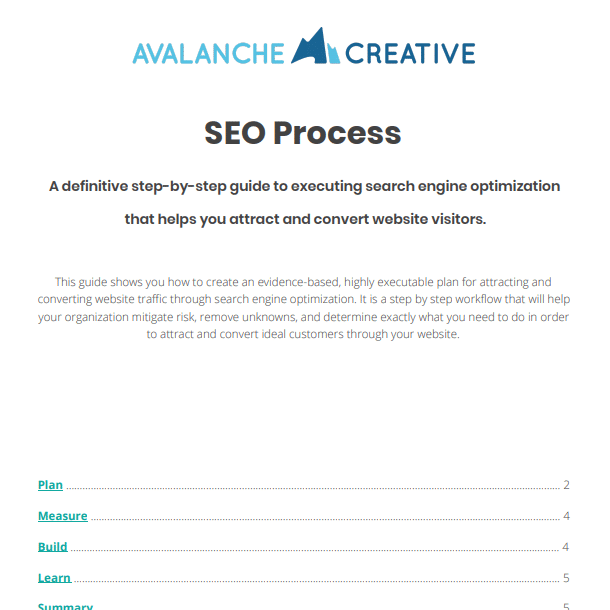.COM, .NET, .ORG, .US: What’s the Difference?
Category: Website Strategy | Tags:
There are many technical aspects of a website that can affect Google’s ability to crawl its information to rank it in search results. One question that tends to come up frequently when creating a new website relates to the site domain—particularly, the last part of the URL, known as the domain extension.
Let’s talk about the different types of domain extensions and things to consider when building a high-quality, rankable website.
What is a domain extension?
When you are navigating to a particular page of a website, your browser uses a URL to get there. The last part of a website’s URL is known as the domain extension.
For example, Avalanche Creative’s homepage has a URL of https://avalanchegr.com/. The domain extension for our website is .com, which is probably the most common.
However, there are many other domain extensions that you might come across as options when choosing a domain for your website.
What are the different types of domain extensions?
In the early days of the internet, certain domain extensions were designed to be used for certain purposes. For example, .net was meant to be used for networking companies and .com was meant to be used for commercial purposes. However, these two extensions are widely used for all different types of registrants.
Some domain extensions designate a particular country. Here are some examples:
- .us (United States)
- .ca (Canada)
- .cn (China)
- .de (Germany)
- .uk (United Kingdom)
There are some domain extensions that were created for certain countries but are actually marketed to represent something else. For example, .tv is marketed to represent television, but it was originally created for Tuvalu. Another example is .ly which is widely used by URL shorteners like bit.ly and owl.ly, but is actually a country code for Libya.
What are the differences between domain extensions like .com, .net, etc.?
Technically speaking, there aren’t any major differences between most domain extensions, especially popular extensions like .com, .net, and .org. As long as you are using the proper domain extension for a particular URL, you will reach your desired website just as quickly as any other extension.
For the most part, there is open registration available for all domain extensions, which means that anyone can purchase and register for a domain that uses any extension. There are a few exceptions to this, however.
Which domain extensions are regulated?
Although most domain extensions were created with a certain purpose or category in mind, there are only a handful that do not have open registration. Below are some of the most common restricted extensions.
.gov
This domain extension is only used by US governmental agencies, both at the federal level and state/local level.
.mil
This extension is used only by the US military.
.edu
The .edu domain extension is used only by post-secondary educational institutions, like colleges and universities.
Which is the best domain extension for SEO?
As with many things in SEO, the best domain extension to use if you’d like to improve your search engine optimization is: It depends.
You’ll find that there are plenty of high-quality websites that use different domain extensions. Google does not use domain extensions as a ranking factor, unless you’re looking at things from a national level. A website that uses a .de (Germany) domain extension, for example, is more likely to rank well for users in Germany than users in the US.
Just like with content, if you’re looking for an SEO-friendly domain, choose a user-friendly domain. We know that a higher-traffic website will be seen as more valuable in the eyes of search engines like Google.
With this in mind, it might make more sense from a branding perspective to register a .com domain instead of a .net, .biz, etc. This is because .com is the most popular domain extension and is easiest to remember. That way, in case someone is trying to remember your website off the top of their head, they’re more likely to enter a .com domain into their browser.
When creating a website, choosing the perfect domain is just one of the many decisions you will have to make that will affect your website’s search rankings. The most important thing to keep in mind is that a domain that is easy to remember is always a great choice.
Get Started Today
We love to help businesses grow with our research- and empathy-driven SEO. Chat with us to learn more about our process and begin increasing your leads.
Share this article:
The Avalanche Email: Fun. Simple. Educational. No Selling.
Learn Result-focused SEO & Content
Join over 2,272+ others who get one email every Wednesday with simple instructions on how to get more website traffic and leads through SEO and content marketing. (Learn more about the email)
Keep Learning
Creating the Perfect SEO Content Template in Google Docs
Learn how to create an SEO Content Templates in Google Docs to help drive new traffic to your website from the search engines. SEO Content Templates provide specific recommendations and directives for creating new content on your website with the purpose of improving your SEO.
How To Show Up in Gemini (And Win More Local Jobs)
Show up in Gemini when homeowners search for landscaping services. Build the right signals on Google and your website to win more qualified local jobs.
How to Run Google Ads for Landscapers: A Complete Guide
Learn how to set up Google Ads for landscapers, attract qualified leads, and win more local jobs with this step-by-step guide.
🏔️ Watering > Planting New Seeds
Your next marketing win may already be on your site. Learn how to optimize existing pages for better rankings, traffic, and results.
The Recipe vs. The Meal
Your customers buy the experience, not the product. Discover a simple way to shift your message from ingredients to the full meal.
What’s the Best CMS for Landscaping Businesses?
Compare the best website platforms for landscapers. Learn the pros and cons of Wix, Squarespace, and WordPress, and why WordPress is best for long-term SEO.






